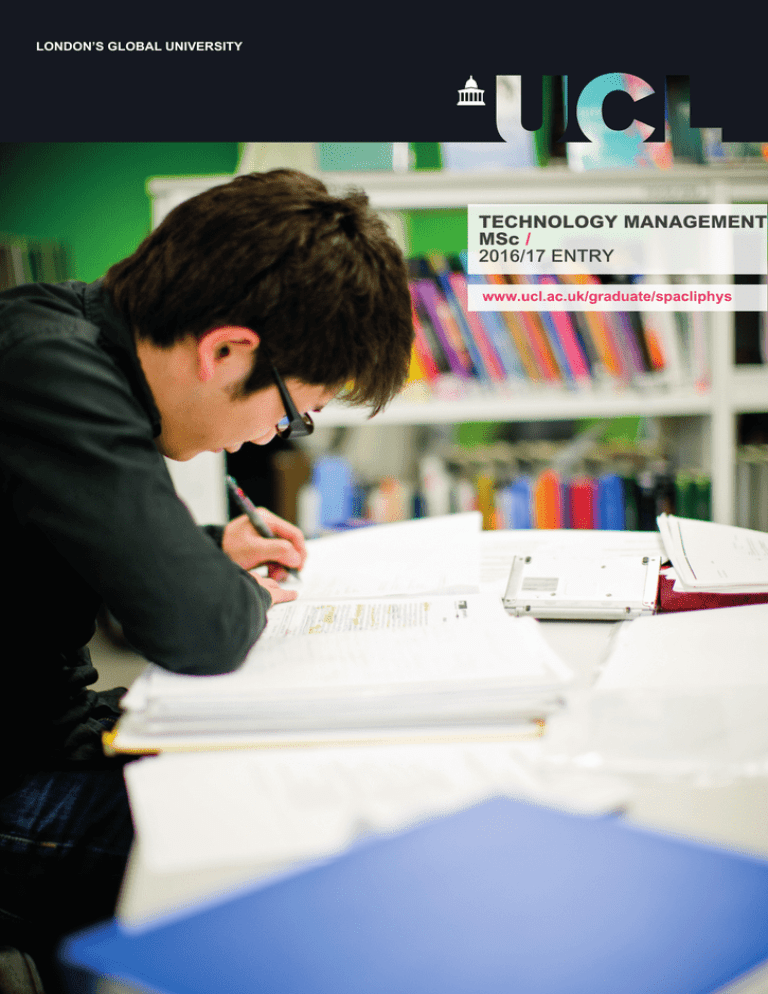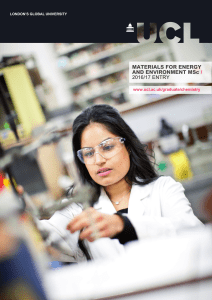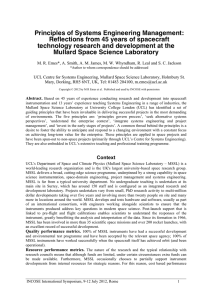TECHNOLOGY MANAGEMENT MSc / 2016/17 ENTRY
advertisement

LONDON’S GLOBAL UNIVERSITY TECHNOLOGY MANAGEMENT MSc / 2016/17 ENTRY www.ucl.ac.uk/graduate/spacliphys Technology Management MSc / The Technology Management Group of UCL’s Mullard Space Science Laboratory (MSSL) and UCL Centre for Systems Engineering (UCLse) have pooled expertise to develop this exciting new programme, which aims to equip students with the knowledge and skills necessary to develop a career in technology management or engineering management. Degree summary Students learn about the challenges and opportunities of working with new and legacy technology, and are introduced to key concepts such as technology maturity, lifecycles, risk, reliability and resilience. Systems and strategic thinking is promoted throughout, and the importance of the enterprise context. The research elements aim to instil a deep knowledge of at least one area of technology management with industrial relevance. // The programme blends general principles of management with technology-focused teaching and integrates aspects of systems engineering and project management; the UCL Mullard Space Science Laboratory has nearly fifty years’ experience of developing cutting-edge spacecraft technology, and the programme content builds on research conducted by the Technology Management Group at MSSL in these areas. // The programme contains two compulsory modules relevant to leadership and entrepreneurship (Technology Strategy, and Business Environment). These modules will give students the knowledge and skills necessary to lead new technology-driven enterprises. // The curriculum has an international focus, with case studies from major technology companies around the world including Apple, Samsung and Lenovo. A number of industrial visits are anticipated and this ‘real world’ exposure to organisations will help contextualise the theory and techniques learnt. Teaching methods incorporate a mix of lectures and case study-based teaching, and groupwork, in which students will be challenged to come up with novel ideas, lead groups to innovative solutions and manage complex tasks under tight time pressure. Assessment is through coursework, examinations, written reports and presentations, and the dissertation. Degree structure Mode: Full-time: 1 year Students undertake modules to the value of 180 credits. The programme consists of four core taught modules (60 credits), two optional taught modules (30 credits) and three research modules (90 credits). CORE MODULES // Business Environment // Lifecycle Management // Risk, Reliability, Resilience // Technology Strategy OPTIONS // Students choose two from the following: // Defence Systems // Environmental Systems* // Project Management* // Rail Systems // Responsible Science and Innovation* // Spacecraft Systems // Systems Design // Systems, Society and Sustainability* // *These modules are delivered by other UCL departments (subject to availability) RESEARCH MODULES // Students undertake a structured research programme comprising: Emerging Technology Review (group project, 15 credits) Technology Management Project Concept (15 credits) Technology Management Research Project (60 credits, including a 12,000-word dissertation) Your career UCLse has strong links with companies in the aerospace, communications, construction, energy, transport and defence sectors and our Industrial Advisory Board ensures relevance to industry. Typical career destinations might include: // Graduate Systems Engineer (Airbus, BAE Systems, Boeing, GE, GDUK, SELEX, THALES, Ultra Electronics) // Technology/Business Consultant (Accenture, Capgemini, Deloitte, Ernst & Young, KPMG, PwC). Employability Drawing on our experience of providing short training courses for industry (such as the Project Manager training courses we run for the European Space Agency) we will integrate a large amount of skills development into our teaching, including skills in communication, negotiation, leadership and motivation, decision-making, and managing complex, time-constrained tasks, all of which will be beneficial for future careers. Entry requirements A minimum of a second-class UK Bachelor’s degree in science, engineering or management, or an overseas qualification of an equivalent standard. Candidates must also meet UCL’s English language proficiency requirements. FEES AND FUNDING // UK & EU (2016/17) entry: £11,090 (FT) // Overseas (2016/17) entry: £25,140 (FT) Full details of funding opportunities can be found on the UCL Scholarships website: www.ucl.ac.uk/scholarships English language proficiency level If your education has not been conducted in the English language, you will be expected to demonstrate evidence of an adequate level of English proficiency. APPLICATION DATE The level of English language proficiency for this programme is: Good. CONTACT Information about the evidence required, acceptable qualifications and test providers is provided at: www.ucl.ac.uk/graduate/english-requirements Ms Katrina Walker Your application The deadline for all applicants is 29 July 2016. Students are advised to apply as early as possible due to competition for places. Those applying for scholarship funding (particularly overseas applicants) should take note of application deadlines. When we assess your application we would like to learn: // // // // why you want to study Technology Management at graduate level // where you would like to go professionally with your degree why you want to study Technology Management at UCL what particularly attracts you to this programme how your personal, academic and professional background meets the demands of this challenging programme Together with essential academic requirements, the personal statement is your opportunity to illustrate whether your reasons for applying to this programme match what the programme will deliver. Details on how to apply are available on the website at: www.ucl.ac.uk/graduate/apply PDF Updated: May 25, 2016 Information correct at time of going to press. See website (www.ucl.ac.uk/mssl) for latest information All applicants: 29 July 2016 Email: edu@mssl.ucl.ac.uk Telephone: +44 (0)20 7679 4909


